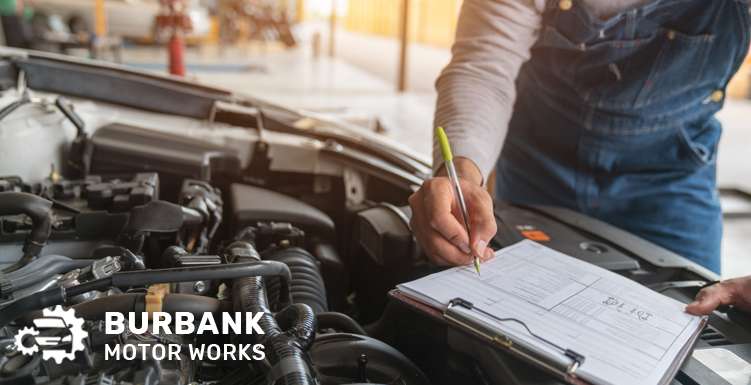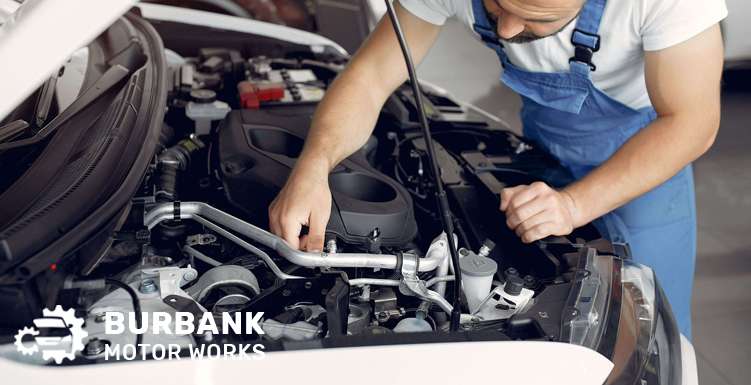
Address: 2208 W Burbank Blvd, Burbank, CA 91506

Mon - Fri: 7:45 Am - 5:30 Pm
Sat: 8:00 Am - 2:30 Pm
Sun: Closed

Address: 2208 W Burbank Blvd, Burbank, CA 91506

Mon - Fri: 7:45 Am - 5:30 Pm
Sat: 8:00 Am - 2:30 Pm
Sun: Closed
Let’s talk about something super important – your car’s transmission. Think of it as the heart of your car’s movement. It helps your car change gears and move smoothly. Just like how we need to stay healthy, your car’s transmission needs proper maintenance too. Sometimes, it might not feel right when you’re driving. Maybe your car makes weird noises or doesn’t move like it should. These could be signs that your transmission needs attention. Don’t worry, though! We’re here to help you understand what’s going on and how to approach transmission maintenance. So, let’s get started on this journey to become transmission experts!

Let’s start with the basics. Your car’s transmission is like a big helper. It takes the power from the engine and sends it to the wheels. This makes your car move. Without it, your car wouldn’t go anywhere!
There are two main types of transmissions:
Both types do the same job. They help your car use the right amount of power. This happens whether you’re starting from a stop or driving fast on the highway.
A healthy transmission is super important. It helps your car run smoothly, use less gas, and makes your ride more comfortable. Keeping up with regular transmission maintenance can extend your car’s lifespan and help avoid bigger problems down the road.
Now, let’s talk about how to know if your transmission might be sick. Here are some signs to watch out for:
If you notice any of these signs, it’s time to take action. Don’t ignore them! The sooner you deal with problems, the better.
Checking your transmission fluid is easy. It’s like checking the oil in your car. Here’s how you can do it:
Regularly checking of fluid levels is a key part of transmission maintenance. This simple task can help you catch problems early.
Transmission fluid is super important. It’s like blood for your transmission. Here’s what you need to know:
Remember, good fluid keeps your transmission happy. Take care of it, and it will take care of you!
You don’t need to be a mechanic to keep an eye on your transmission. Here are some easy checks you can do yourself:
Doing these checks can help you catch problems early. This can save you time and trouble in the long run.
Sometimes, you need an expert’s help with transmission maintenance. Here are signs that it’s time to see a mechanic:
Don’t wait too long if you notice these issues. A small problem can turn into a big one if you ignore it.
Taking care of your transmission can prevent many problems. Here are some tips to keep it healthy:
These simple steps can help your transmission last longer. They can also save you money in the long run.

Sometimes, a transmission needs more than just a simple fix. In these cases, you might hear about rebuilds or replacements. Let’s break these down:
Transmission Rebuild:
Transmission Replacement:
Both of these are big jobs. They take time and skill to do right. If you need either of these, make sure to go to a trusted mechanic.
Car technology is always changing. This includes transmissions too. Here are some cool things happening:
As cars change, taking care of them might change too. But the basics of keeping things clean and well-maintained will always be important.
Your car’s transmission plays a crucial role in ensuring smooth and efficient driving. We’ve discussed key signs that indicate potential transmission issues, such as unusual noises, strange smells, or changes in how your car drives. Learning how to check transmission fluid and perform basic maintenance at home can help you catch issues early. Taking care of your transmission isn’t complicated—regular checkups and adopting good driving habits go a long way. If you’re ever in doubt, consult a mechanic—they’re the experts! By staying proactive with maintenance, you can extend the life of your transmission, ensuring a smoother, safer, and more enjoyable ride. Keep these tips in mind, and enjoy the road ahead!
Yes, it can! Extreme heat can make transmission fluid break down faster. Cold weather can make the fluid thicker, making it harder for your transmission to work. In very cold places, warming up your car before driving can help.
Towing is okay if you follow your car’s rules. Check your manual for how much weight your car can tow. Towing too much can hurt your transmission. Also, make sure to use the right towing gear to keep your car safe.
With good care, a transmission can last 150,000 to 200,000 miles or more. But this depends on many things. The type of car, how you drive, and how well you maintain it all matter. Regular checkups and fluid changes can help it last longer.
Yes! Avoid shifting gears while the car is still moving. Don’t rest your foot on the clutch pedal in manual cars. Try not to shift into drive or reverse before the car has fully stopped. These habits can help your transmission stay healthy longer.
Call us for booking an early appointment and get all your car related problems solved by our experts.